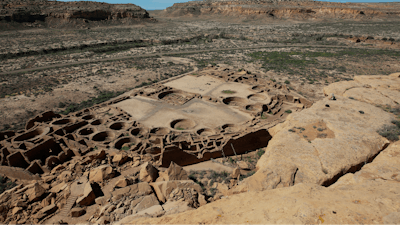
SANTA FE, N.M. (AP) — Hundreds of square miles in New Mexico will be withdrawn from further oil and gas production for the next 20 years on the outskirts of Chaco Culture National Historical Park that tribal communities consider sacred, the Biden administration ordered Friday.
The new order from Secretary of the Interior Deb Haaland applies to public lands and associated mineral rights within a 10-mile (16-kilometer) radius of the park. It does not apply to entities that are privately, state- or tribal-owned. Existing leases won't be impacted either.
A World Heritage site, Chaco Culture National Historical Park is thought to be the center of what was once a hub of Indigenous civilization, with many tribes from the Southwest tracing their roots to the high desert outpost.
After extensive studies and consultations, the plan has pitted the Navajo Nation against other tribes in the region amid concerns about economic impacts and that individual Navajo allotment owners may be left landlocked by restrictions on public land.
"Today marks an important step in fulfilling President Biden's commitments to Indian Country, by protecting Chaco Canyon, a sacred place that holds deep meaning for the Indigenous peoples whose ancestors have called this place home since time immemorial," Haaland said in a statement. "I value and appreciate the many Tribal leaders, elected officials, and stakeholders who have persisted in their work to conserve this special area."
A recent assessment published by the Interior Department shows that the withdrawal will result in a few dozen wells not being drilled.
The New Mexico Oil and Gas Association has argued that the plan would leave additional leases on Navajo land or allotments owned by individual Navajos landlocked by taking federal mineral holdings off the board.
Navajo Nation officials have made similar arguments, saying millions of dollars in annual oil and gas revenues benefit the tribe and individual tribal members. The Navajo Nation completed its own study last year and advocated for a smaller area to be set aside given the economic impacts a withdrawal would have on the tribe.
On Friday, Navajo Nation President Buu Nygren and Council Speaker Crystalyne Curley expressed disappointment in the Interior Department's decision.
"The Navajo Nation attempted to compromise by proposing a 5-mile buffer as opposed to the 10-mile," Curley said. "The Biden Administration has undermined the position of the Navajo Nation with today's action and impacted the livelihood of thousands of Navajo allotment owners and their families."
The Bureau of Land Management said the 10-mile (16-kilometer) radius would help protect more than 4,700 known archaeological sites outside the Chaco Culture National Historical Park, while a 5-mile (8-kilometer) radius would encompass about 2,800 of the sites.
President Joe Biden initially proposed the ban in November 2021 at the White House Tribal Nations Summit. Since then, interviews, planning sessions and meetings with historic preservation experts and others have taken place.
A coalition of environmental groups and Native American activists that campaigned for the restrictions applauded Friday's order as a good first step in protecting cultural sites and the region from pollution and climate change.
"Full landscape management to phase out new and existing oil and gas development is a necessary next step," said Julia Bernal, executive director of Pueblo Action Alliance.
Federal officials have billed the Chaco initiative as a novel effort that could provide a roadmap and lessons learned for future collaborations with tribes.
New Mexico's congressional delegation reintroduced legislation last month that would formalize the same buffer around the park. It would span more than 490 square miles (1,269 square kilometers) of federal land.
In addition to the approved withdrawal, Haaland — who is from Laguna Pueblo and is the first Native American to lead a Cabinet agency — has committed to taking a broader look at how federal land across the region can be better managed while taking into account environmental effects and cultural preservation.






















